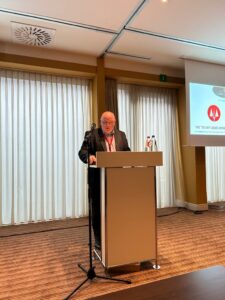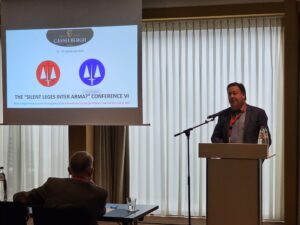The ‘Silent Leges Inter Arma?’ Conference VI
From 19 to 22 September 2013, the Belgian Group of the International Society for Military Law and the Law of War (ISMLLW) organised the sixth ‘Silent leges inter arma?’ conference. This international conference brought together practitioners and academics active in the field of law, security and defence from a wide variety of countries, to discuss the following topics:
- Post-conflict Accountability for Violations of International Humanitarian Law, in Historical and Contemporary Contexts
- Evolutions in the Cyber Domain
- Military Activities and Presence in Outer Space
- International Humanitarian Law and Counter-terrorism Legislation
- The Right to Life of a Soldier in Combat
- Hybrid Threats
The conference was opened by H.E. Mrs. Ariadne Petridis, Ambassador, Head of the Permanent Representation of the Kingdom of Belgium to NATO. She was introduced by Mr. Ludwig Van Der Veken, Chairman of the Belgian Group and Secretary-General of the ISMLLW. The Ambassador focused on the outcome of the NATO Vilnius Summit, the strengthening of the defence and deterrence of the Alliance and the continuing support to Ukraine.
EUROMIL actively participated in the conference. President Emmanuel Jacob was invited to chair the 5th panel on the rights of life of a soldier in Combat. EUROMIL’s President used the opportunity to introduce the session with an overview of EUROMIL’s workings in the field of security and defence and working conditions of military personnel, while also underlining the importance of preventing suicide in the military and posing the question on state’s responsibility in such cases.
The panel consisted of two distinguished speakers who contributed to a better understanding of the current legal framework concerning the topic. Firstly, Prof. Dr. Valeria Eboli, Italian Naval Academy underlined that according to article 2 of the ECHR, everyone’s right to life shall be protected by law. Members of the Armed Forces, however, despite running a particular risk of death during certain dangerous operations, should not be exposed to situations where their lives would be put at avoidable risk without a clear and legitimate military purpose. In this regard, the state should ensure proper training, equipment, and access to medical care.
Secondly, Dr. Jan Arno Hessbruegge, Visiting Professor, University for Peace, Costa Rica & Human Rights Officer, United Nations presented examples of discriminatory assignment of risks as assigning politically expendable minorities to riskier missions. Furthermore, he analysed the notion of the unnecessary assignment of risk, as failure to organise casualty evacuations or provide medical care, which also derives from International Humanitarian Law duty.
Lastly, the speakers and the participants exchanged views on the situation in Ukraine and the fact that in Ukraine the combatants are not only from the Armed Forces but also civilians and volunteers, and thus, what responsibility has the state towards them. The speakers underlined that there is not a difference for the right to life, but the fact that they are not well trained for such positions it can be exposition to risks.
To conclude, on the discussion whether the state has responsibility for cases of suicide, Dr. Jan Arno Hessbruegge underscored that it depends, because it can be a negative obligation of the state (e.g. hazing of new recruitments) and thus what environment has the state created for them when the suicide was committed. On the other hand, it also depends whether the state provides sufficient medical and psychological measures to prevent unnecessary deaths. Lastly, Dr. Valeria Eboli highlighted that the protection of right to life of a soldier is also from itself and the state must be aware and prevent such risks.
EUROMIL was pleased to discuss this important topic with distinguished ISMLLW members and will certainly follow-up on the issue.

Emmanuel Jacob, President of EUROMIL

Ludwig Van Der Veken, Chairman of the Belgian Group and Secretary-General of the ISMLLW

